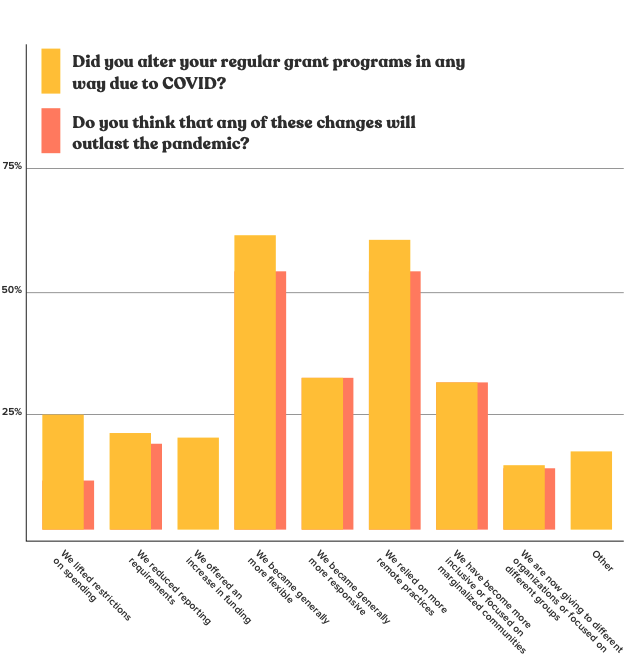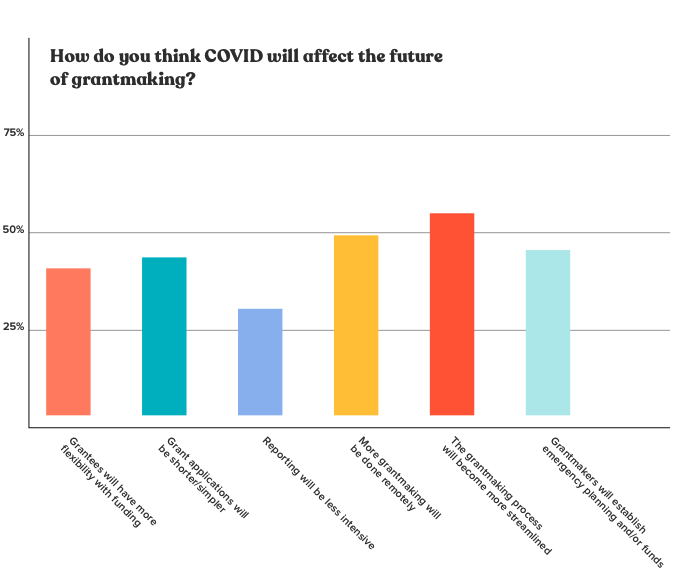Every person and organization faced a mountain of challenges as the COVID-19 pandemic spread across the globe in early 2020. Grantmakers and foundations were no exception. Funders underwent shifts that affected their mission and impact. They also were compelled to address new difficulties from a distance, and pivot dramatically to meet the moment.
To learn more, Submittable surveyed over 100 clients in the grants, foundations, corporate giving, and nonprofit spaces. In a 10-question survey, we asked funders about how COVID-19 affected their mission and impact—including how they addressed new difficulties from a distance, which decisions helped them meet the moment, and what they believe will stick around.
Here are a few highlights from the data. Be sure to download the full report for candid thoughts, feelings, advice, and insights from leading grantmakers about what it was like to give in 2020, and how it will shape philanthropy going forward
A crisis demands adjustments and flexibility
From top to bottom, COVID-19 altered the landscape of grants and giving. We asked funders about their biggest shifts and challenges. As survey responses show:
- 68% of funders reported that their day-to-day operations were altered in some way by the pandemic.
- More than half of the organizations surveyed reported that their funding and budget changed in 2020 due to coronavirus.
- The most common challenge grantmakers reported (65%) was around shifting to remote work.
- Funders also reported big challenges around funding issues (41%) and setting up emergency grants fast (40%).
As a result of these adjustments and complexities, grantmakers became more agile to better serve grant applicants in crisis, as well as their own teams—with changes expected to outlast COVID-19. For example:
- 64% of organizations reported greater flexibility in their application process and how they interacted with grantees.
- One in four grantmakers lifted requirements on spending and reporting for grantees.
- One in three funders became more responsive and more inclusive or focused on marginalized communities.
- 40% of survey respondents believe grantees will continue to be granted more flexibility post-pandemic.

Streamlining grants processes and going remote
Greater flexibility in the grant management process was coupled with increased dependence on technology in the sector and streamlining practices that are likely to stick around. According to survey data:
- Four in ten organizations said that they changed their grant management process because of the pandemic.
- Over half of respondents (55%) believe that grantmaking will permanently become more streamlined, through the increased use of technology and better, quicker practices.
- 43% of funders think that grant applications will continue to be simplified.

In fact, half of all surveyed grantmakers acknowledged that the pandemic led them to make changes they already wanted to incorporate.
As The Dramatists Guild Foundation wrote,
We had been planning to clarify, streamline, and staff up, but I had been putting it off because the application load didn’t necessitate it. We were perfectly fine operating a B+ program. When volume of applications exponentially increased, we had no option but to better oil the machine and make sure our program was A+.
It turns out remote practices are also here to stay. Organizations are thinking more proactively about the future:
- 63% of organizations reported that they quickly shifted into remote solutions for grantmaking.
- Over half of survey participants are planning to keep some remote practices in place.
- Nearly half of funders think that more grantmakers will create emergency plans, policies, and funding moving forward.
As Luke Palermo of Japan ICU Foundation put it,
COVID has put organizations in a tough spot, but hopefully it has inspired grant managers to realize that a lot more things are possible than they might have realized.
Learning that continues
The last global pandemic to strike humanity was the Spanish Flu in 1918. And the reality is, we simply can’t predict when we may next be affected by a viral public health crisis of similar size and scope. We know that any kind of disaster or emergency, whether local, regional, national, or worldwide, tends to disproportionately impact those most vulnerable. This means that they’ll continue to be a call to action for the world of giving and philanthropy as well, whose efforts are more needed than ever.
While the particulars of the pandemic may not materialize again, the lessons that we’ve learned from the events of 2020 will surely help us navigate the unknown future. Meanwhile, the innovations we’ve collectively discovered can help giving institutions increase their impact no matter the conditions.
Access the full report, “COVID’s Effect and Influence on Grant Management,” to learn more. Data and personal insights focus on the following topics.
- How the pandemic affected funders’ missions and impact
- The biggest challenges faced by giving organizations in 2020
- How grantmakers altered their processes to keep awarding funds
- How grantmakers created and distributed emergency grants fast
- Which changes in grantmaking were accelerated by COVID-19
- What changes in grantmaking may be permanent after coronavirus
- Post-pandemic grantmaking best practices